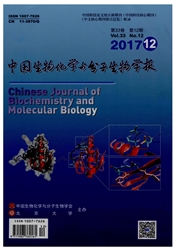

 中文摘要:
中文摘要:
为了进一步探讨SO2的毒理学作用机制,运用荧光实时定量RT-PCR和免疫组化技术研究SO,吸入对大鼠肝细胞中p53、bax和bcl-2三种细胞凋亡相关基因mRNA和蛋白表达的影响.结果显示,肝中p53和bax mRNA水平呈剂量依赖性增加,在SO2浓度为28.00和56.00mg/m3时显著增加(p53 mRNA在28 mg/m3为1.30倍,在56 mg/m3为3.43倍;bax mRNA在28 mg/m3为1.63倍,在56 mg/m3为2.17倍);而bcl-2 mRNA水平显著降低(在28 mg/m3为0.63倍,在56 mg/m3为0.45倍).免疫组化实验结果表明,吸入SO2后,大鼠肝中p53和bax蛋白表达水平呈剂量依赖性增加,而bcl-2蛋白表达水平呈剂量依赖性降低.结果表明,SO2可以改变凋亡相关基因的表达,诱导大鼠肝组织细胞凋亡,这可能与一些凋亡相关疾病的发生有关.
 英文摘要:
英文摘要:
The mRNA and protein levels of p53, bax, bcl-2 were analyzed in livers using a real-time reverse transcfiption-polymcrase chain reaction (real-time RT-PCR) assay and immunohistochemistry method, respectively. Our results showed that mRNA levels of p53 and bax were increased in a dose-dependent manner and at the SO2 concentrations of 28.00 and 56.00 mg/m^3 their increases were significant, while mRNA levels of bcl-2 were decreased significantly in livers of rats exposed to SO2 . Dose-dependent increases of p53 and bax proteins in the livers were observed after SO2 inhalation, while decrease of bcl-2 protein levels was obtained using immunohistochemistry method. These results lead to a conclusion that exposure SO2 can change the expression of apoptosis-related genes, and it suggests that SO2 can induce apoptosis in liver of rat and may be related with some apoptosis-related diseases. Elucidating the expression patterns of those factors after SO2 inhalation might be critical to our understanding mechanisms of SO2 toxicity and helpful for the therapeutic intervention.
 同期刊论文项目
同期刊论文项目
 同项目期刊论文
同项目期刊论文
 期刊信息
期刊信息
